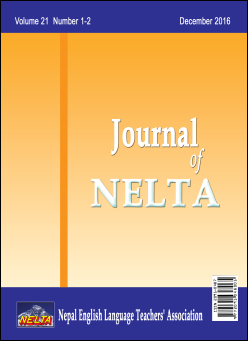Extensive Reading in Foreign Language Classes
DOI:
https://doi.org/10.3126/nelta.v21i1-2.20204Keywords:
Extensive reading, Materials, Objectives, Teacher rolesAbstract
Extensive reading (ER) has been advocated for having numerous benefits and values to foreign language classes. The Faculty of Education, Tribhuvan University has prescribed a wide range of textbooks, reference materials, and web-based materials, especially for Masters’ students. Besides, these learners are required to read out-of-the-course materials, too. These contexts call for extensive reading on the part of the learners. Based on this background, the present study aimed to explore the learners’ choice for reading materials, their purposes of reading, and the expected teacher roles. The study followed the survey research design. The respondents were 100 M.Ed. 1st and 2nd year English students of the academic year 2014-15 A.D. of Prithvi Narayan Campus, Pokhara. The respondents preferred easy, interesting, informative and enjoyable materials to read; their objective of reading was to obtain general information; and they expected teachers to be prompter, participant, counselor, and role model.
Journal of NELTA, Vol. 21, No. 1-2, 2016, Page: 86-92
Downloads
Downloads
Published
How to Cite
Issue
Section
License
© Nepal English Language Teachers’ Association (NELTA)
Authors are required to transfer their copyright to the Nepal English Language Teachers' Association (NELTA)
The Journal of NELTA is copyright by Nepal English Language Teachers’ Association (NELTA). Apart from citing/referencing in academic works, no part of any materials may be reproduced by any process without prior written permission from its copyright owner – NELTA. Requests and enquiries concerning reproduction and rights may be addressed to NELTA or the editorial board at neltaeditorialboard@gmail.com.




